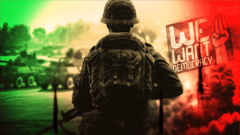In a startling turn of events within Myanmar, the military, once an unassailable force, is now facing serious internal dissent. A recent investigation by the BBC has uncovered a network of soldier-spies, dubbed "Watermelons," who are secretly supporting pro-democracy rebels while outwardly appearing loyal to the junta.
According to the findings, the military currently has full control over less than 25% of the country, struggling to maintain dominance amidst significant territorial losses in the past year. Despite the junta's authority in major urban areas, it has been significantly undermined by coordinated resistance efforts. The term "Watermelon" highlights the spies' duality: green representing their apparent loyalty to the military and red signifying their allegiance to the rebels.
Witness accounts reveal deep disillusionment among military personnel. One major, referred to as Kyaw (a pseudonym), shared his traumatic experiences of witnessing atrocities committed against civilians by his colleagues. Motivated by the brutality of their actions, Kyaw, alongside his wife, resolved to aid the revolution by becoming a spy. He has been leaking sensitive military information to the People's Defense Forces (PDF), allowing the rebels to stage ambushes and avoid military offensives.
Recent assessments of governance in Myanmar show that armed resistance groups and ethnic armies now dominate 42% of the territory, a notable shift in the power balance. The BBC's analysis indicated that the military's control is at its lowest since the junta's rise to power in 1962, according to data from the Armed Conflict Location and Event Data Project.
The growing spy network is facilitated by former military personnel, like Win Aung, who have defected and now manage the "Watermelon" unit. These agents are crucial in gathering intelligence and recruiting new spies through social media channels. Their ranks span from low-level soldiers to higher-ranking officers, expanding the rebels' capabilities in the ongoing conflict.
Yet the risks for these spies are immense. Both the military and opposition forces pose threats to their safety. One navy corporal, who went by the name "Moe," described the terrifying reality of being a spy; he faced imminent danger during combat situations and ultimately sought refuge with the resistance.
Resistance leaders, such as Daeva, highlight the transformative potential of the intelligence provided by spies. Strategic operations have been executed largely due to the insights offered by these agents, even as military forces continue to resist reclaiming lost territory through aerial bombardments and aggressive strategies.
Despite the persistent dangers, the defection rates are climbing as more soldiers aspire to abandon the military's violent tactics. The mental toll and fear of reconnaissance operations instilled by the generals have pushed individuals like Kyaw to find ways to survive. As highlighted by Win Aung, an assurance of safety remains a challenge due to the unpredictable nature of warfare.
In a conflict where changing allegiances reshape the landscape, "Watermelons" are crucial players in Myanmar's pro-democracy movement. The ultimate outcomes for these spies remain uncertain, but their impact on the resistance is undeniable as Myanmar's civil strife continues to evolve.
According to the findings, the military currently has full control over less than 25% of the country, struggling to maintain dominance amidst significant territorial losses in the past year. Despite the junta's authority in major urban areas, it has been significantly undermined by coordinated resistance efforts. The term "Watermelon" highlights the spies' duality: green representing their apparent loyalty to the military and red signifying their allegiance to the rebels.
Witness accounts reveal deep disillusionment among military personnel. One major, referred to as Kyaw (a pseudonym), shared his traumatic experiences of witnessing atrocities committed against civilians by his colleagues. Motivated by the brutality of their actions, Kyaw, alongside his wife, resolved to aid the revolution by becoming a spy. He has been leaking sensitive military information to the People's Defense Forces (PDF), allowing the rebels to stage ambushes and avoid military offensives.
Recent assessments of governance in Myanmar show that armed resistance groups and ethnic armies now dominate 42% of the territory, a notable shift in the power balance. The BBC's analysis indicated that the military's control is at its lowest since the junta's rise to power in 1962, according to data from the Armed Conflict Location and Event Data Project.
The growing spy network is facilitated by former military personnel, like Win Aung, who have defected and now manage the "Watermelon" unit. These agents are crucial in gathering intelligence and recruiting new spies through social media channels. Their ranks span from low-level soldiers to higher-ranking officers, expanding the rebels' capabilities in the ongoing conflict.
Yet the risks for these spies are immense. Both the military and opposition forces pose threats to their safety. One navy corporal, who went by the name "Moe," described the terrifying reality of being a spy; he faced imminent danger during combat situations and ultimately sought refuge with the resistance.
Resistance leaders, such as Daeva, highlight the transformative potential of the intelligence provided by spies. Strategic operations have been executed largely due to the insights offered by these agents, even as military forces continue to resist reclaiming lost territory through aerial bombardments and aggressive strategies.
Despite the persistent dangers, the defection rates are climbing as more soldiers aspire to abandon the military's violent tactics. The mental toll and fear of reconnaissance operations instilled by the generals have pushed individuals like Kyaw to find ways to survive. As highlighted by Win Aung, an assurance of safety remains a challenge due to the unpredictable nature of warfare.
In a conflict where changing allegiances reshape the landscape, "Watermelons" are crucial players in Myanmar's pro-democracy movement. The ultimate outcomes for these spies remain uncertain, but their impact on the resistance is undeniable as Myanmar's civil strife continues to evolve.





















